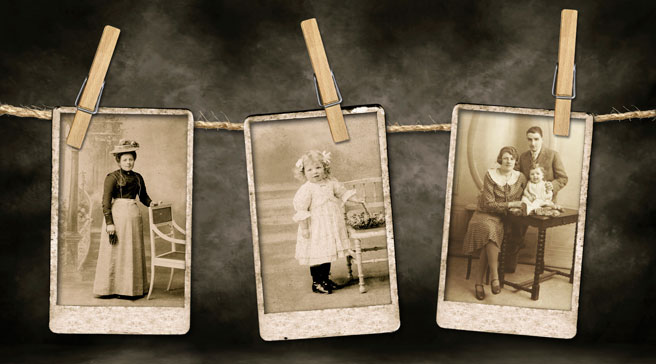Reincarnation and regression
A growing number of people say they believe in reincarnation, even if they don’t have any particular religious faith. Can learning about past lives lead to greater self-knowledge? asks Tanis Taylor

According to recent statistics, our national appetite for information on reincarnation and the afterlife is growing. Over half of us believe in life after death, a study by religious think tank Theos revealed last year, while 70 per cent adhere to the existence of a human soul. And growing numbers of people are signing up for past-life regressions, a practice where a therapist guides an individual through past lives under hypnosis.
First, the bad news. Statistically, your chances of discovering you were Cleopatra in a past life are slim – about 107 billion to one. Despite what you might wish, the law of averages means you are rather more likely to have had what’s known as a ‘chicken feeder’ existence, featuring decidedly unglamorous menial labour swiftly followed by an untimely end. My first past-life regression took me back to a life as an unmarried librarian who died of consumption, alone and impoverished in the East End of London. During a second session, I encountered a previous existence as a small, mute boy in Papua New Guinea, who met with the sharp end of a spear.
Which brings me to the good news. If nothing else, exploring your past lives can make you extremely grateful for the present. For many, this fascination with life beyond life sits within an organised belief system, such as the Hindu idea of ‘moksha’, or release – a belief that you are reincarnated again and again to learn lessons and do good work until you iron out all your karmic kinks. Faiths including Buddhism, Jainism and Kabbalah offer a connection to the hereafter.
But for some people, in these materialistically advanced but spiritually bankrupt times, there is a belief in reincarnation without the dogma of a religion. A stand-alone notion that this cannot be all there is, that there is a purpose to our particular life as we travel paths that have been somehow celestially ordained. This might sound far-fetched, but proponents of past-life regression (PLR) are more than wistful romantics seeking a glamorous back story.
There have been hundreds of hard-to-explain cases supporting the existence of past lives – some involving xenoglossy (people speaking languages they did not previously know) and children recalling unknowable historical or other period details.
One of the most respected figures in the field is psychiatrist and author Dr Brian Weiss. In 1988, he risked the derision of his peers by writing Many Lives, Many Masters, the edited case notes of one of his clients. Under hypnosis, the young woman, Catherine, accessed hundreds of past lives, recalling details inexplicable for someone living in a pre-Google era. She had presented with crippling panic attacks and a fear of water. Weiss regressed her under hypnosis to the lifetime where her symptoms originated. To his surprise, she identified a past life as Aranda, a young woman in 1836BC who died in a flood. Over several sessions, Catherine’s symptoms disappeared.
The book has gone on to sell a million copies, opening the doors to kindred therapists and a greater public interest in the topic that today extends to Hollywood and Oprah. For his part, Weiss began to add past-life regression to his practice, in cases where conventional therapy and medication were not working. Among the people he has treated are a client with a fear of flying who discovered he had been shot down while piloting an aircraft during World War II, an asthmatic who recalled a death by fire, and a woman who discovered a past life featuring an unjust gallows hanging – she’d come to see Weiss with a mysterious neck pain. Ordinary, symptom-free people also seemed to benefit from the experience. The material a regression might throw up – abandonment, bereavement or starvation in a past life – frequently spoke to the everyday problems people were experiencing – co-dependency, anxiety, weight issues – in this one.
Eight books and thousands of case studies later, Weiss’s early findings on PLR are supported by subsequent books, such as Daniel Benor’s Spiritual Healing: Scientific Validation Of A Healing Revolution. Parapsychologist Hazel Denning’s study of more than 1,000 clients suggested improvements are not merely suggested but sustained, with 24 per cent reporting symptoms had totally disappeared, 23 per cent recording a drastic improvement, and 17 per cent citing noticeable improvement more than five years later. Even sceptics can apparently benefit from the experience. ‘Whether the client believes in it or not, it works,’ says Weiss. ‘It’s the same principle as psychotherapy. Once you understand the root cause – maybe the original trauma that caused the symptom – it disappears, because now there’s understanding. This is true for phobias, psychological states, and also for certain relationships.’
Psychotherapist Sue Cowan-Jenssen has a different, rather generous, interpretation. ‘I think things such as past-life regression work because they give people a narrative that helps them make sense of what might feel inexplicable,’ she says. We humans are reason-making creatures. We cannot bear the not knowing. ‘If you have a narrative, it is hugely helpful – whether it’s the right narrative or not. If it makes sense to you, that can be a huge relief.’
There are caveats, though. Work with a therapist you trust and who can handle any emotion that comes up. And beware the hazards of past-life work becoming an excuse for not getting on with the work in this life. Ingrid Collins, a Harley Street psychotherapist and founder of the Soul Therapy Centre, agrees there is a hunger for meaning beyond materialism. Using PLR, she recalls past lives and resolves issues by engaging in a dialogue with the past-life self. Techniques are more playful than paranormal and she uses the right brain’s functioning (women tend to be better at this than men), visualisations, hypnosis and intuition to admit a spiritual dimension. Since adding an esoteric, spiritual element to her conventional practice, she has noticed a ‘vertical take-off’ in terms of her client base and success, and positive outcomes in just a few sessions, which would have taken years in a traditional therapeutic contract.
Whether you believe that past-life regression is a chance to hit ‘shuffle’ on your previous incarnations, or simply the intricate confabulations of the mind, it does offer an alternative experience to conventional therapy. Christian mystic Teilhard de Chardin said, ‘We are not human beings having a spiritual experience, we are spiritual beings having a human experience.’ For those who agree, PLR offers insight into a framework that puts our lives into context, and effectively frees us from the fear of death. And for believers and sceptics alike, it’s a chance to peek behind the curtain and into the psyche’s projector room in awe and wonder at the meaning of life and death.








